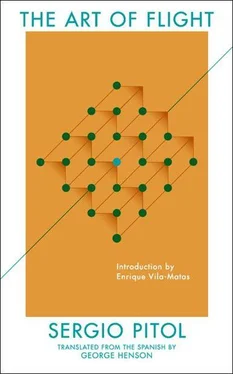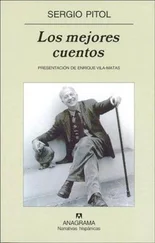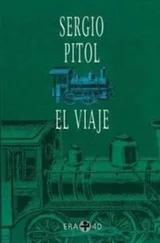The ambitious young provincial sits at the opposite end of the same bench where, facing the sun, the beautiful woman with raven hair is seated. She opens in front of him a copy of The Banner of Youth or Life of Warsaw ; she flips through it with disinterest only to let it fall on her lap and lights a cigarette that she smokes with obvious suggestiveness. Then, with an angelic face and oblivious air, he apologizes to his bench mate and shows her a page from the newspaper as if asking her a question. She turns toward him with a stern look of surprise on her face; she examines the paper and proffers a dry response. Little by little, the seriousness disappears from both their faces. He makes a comment and his smile grows wider; she raises a delicate, reproving finger and shakes it at the young man as if indicating that such things can be said in his village but never in a city like Warsaw, much less to a woman he doesn’t know, but he eventually wins her over with his laugh, and they finally engage in a playful conversation. The young man gets up, takes a few steps around the bench and sits down again, but this time he sits next to his neighbor so he can speak quietly. He probably says something to her about being lonely in the strange city, his fears, and his uncertainties.
After finishing my coffee, I return to my desk and begin to organize my papers. I am translating a story by Iwaszkiewicz entitled “Tatarak.” My dictionary tells me that the word means “aromatic calamus” or “sweet rush,” and that it is an aquatic plant that grows in lakes and ponds of the Baltic region. It is a magnificent story; the ending is tragic and filled with an intense and contained despair; it is about a romantic relationship or, more specifically, the development of a physical passion between a mature woman and a boy whose only attraction is his youth and the naturalness of his manner. Death is lurking throughout the story, but we only notice it at the end, when the boy appears trapped by the roots of the sweet rush. Quotidian lives, worthy, wasted, onto which their owners try to imprint an essential decency. The erotic element is very powerful, but its strength lies in the bowels of its language; the characters may not be aware of it, but their movements, their destiny, seem to be governed by it. All of a sudden, the twilight atmosphere causes me to think, obliquely, of the movie Senso by Visconti. Both the story and the film share a blurred sexuality. They are stories en travesti, or, at least, so it seems. The differences are vast: instead of the hysteria, the operatic madness of the film, there is in the story only opaqueness, a quasi-muteness, one of the greatest qualities in all of Jarosław Iwaszkiewicz’s work. I work with great pleasure, resolving doubts, trying to maintain the same breath that the prose has in Polish. I get up to make sure I have an ironed white shirt and that my black shoes are shined, because that night I’m going to the theater with Zofia Szleyen to see her translation of The Youthful Deeds of the Cid by Guillén de Castro. I’ll pick her up an hour before the function for a light dinner. Going to the theater has been, since childhood, a substitute for a visit to paradise. This past year in Warsaw has been magnificent; in addition to the excellent Polish productions, I’ve seen the Royal Shakespeare Company, and also the Piccolo Teatro di Milano, the Stabile di Genoa, the Maly Theatre of Moscow, the Piraikón of Athens. No less! It is perhaps the only distraction about which I have no regrets; the stage fascinates me, gives me ideas, and renews my energy. The angel of order has taken it upon himself to organize a perfect day for me. Going to the theater is an immense source of pleasure, yes, but it’s also an intellectual activity: I feel no remorse.
I get up again; I go to the bookcase just to make sure I have The Youthful Deeds of the Cid. Before returning to my work, I pause again at the window. I sit for a moment to take in the view. Night is about to fall, but there’s a clarity in the air that outlines the figures perfectly. The characters have changed. The benches in the garden have new occupants, younger, more casual and playful, with binders and folders under their arms or piled on benches; without a doubt, they’re students. The garden paths seem busier. Suddenly, there in the back, where the thick hedgerow usually conceals the lovers, I’m able to make out one of the couples that was beginning to form during my previous break. They say goodbye with an unconvincing formality. Who could it be but the fellow from the provinces and the sensual woman who had to meet her husband at the door of the cinema Skarpa? He walks toward the Krakowskie Przedmieście, she toward a side alley, the one that passes directly beneath my window. She walks with an air of superiority; just steps from the sidewalk, but still within the garden, she stops, opens her purse, takes out a hand mirror, looks at herself, then, satisfied, returns it to her purse; not a single hair has been left out of place. She looks at her watch; she thinks perhaps about her husband, about the scene that awaits her, but this only accentuates her smile, reinvigorates her step, and renders her triumphant; she has become a lioness. By contrast, the young man seems to take pleasure in his disheveled appearance. He’s walking in shirtsleeves; he flips an old summer jacket around with one hand as if it were a mill blade. His seraphic appearance is gone; his tousled hair and the loss of sexual appetite in his step announce his conquest with satyric pride — and how! — mission accomplished. He whistles as he walks. A few steps later he casually touches the crotch of his trouser to make sure the buttons are correctly fastened. A warm breeze, with all the aromas of spring, penetrates the window; the murmur of life begins to arrive to my studio with greater intensity. I sit down in front of my papers, but it’s hard for me to concentrate.
Minutes later, I close the dictionary and put away the drafts my translation of “Tatarak.” I consider myself fanatical about literary work and life. The combination of these qualities is a source of terrible conflicts. I take another folder out of the armoire, unfold other papers on the table, the material I’m about to send to the poet and translator Díez-Canedo: Los climas (The Climates), a book of short stories. With each revision, I discover new atrocities, and I make generous corrections. A never-ending process! The story that interests me most is about a hallucination suffered by a young Mexican who visits his friend, Juan Manuel Torres, in Lodz and returns by train to Warsaw, consumed with fever, one particularly cold winter night. He sits across from an elderly woman who reminds him of a family member, his aunt, whom he knows only from photographs, one of his grandmother’s sisters, who according to family tradition died at sea returning from her honeymoon. The account fuses two stories — the most visible: the journey by train of the feverish boy, his incoherent travel impressions, the encounter with his friend and his discovery of Poland; the other: a hallucination caused by delirium, where the elderly woman on the train is the supposedly dead sister of his grandmother. Reality and delirium treated with the same language. It was the first story I wrote in Poland; I have rewritten it a thousand times, but I find that the language still possesses a repulsive mawkishness and that the “gothic” story, in order not to fail, should be written in an almost transparent language, where unreality is inserted into the real without the seams being visible. I begin to cross out and superimpose words, add lines, omit adjectives, and an insidious anxiety gets the better of me, a sudden sense of claustrophobia. I tell myself that the Spartan rules I’ve imposed on myself are more appropriate in a notary office, in a government agency, anywhere except where a writer works. Does being locked up in a room, leafing through dictionaries, omitting or adding a word here and there not already imply a betrayal to literature? I have spoken ad nauseam of the importance of literature in my life. I have added that if I am still in Warsaw it is because I find the ideal atmosphere for writing here. But write about what, if the material that could nourish a story is down there, in the park, on the street, in the corner coffee shop? The places where life is, those things that don’t happen in this garret where I force myself as punishment, as penance, to lock myself up in front of a typewriter and dictionaries. Would I perhaps have to keep rummaging forever into my childhood and write about my life as a child in Potrero and an adolescent in Córdoba for the rest of my life? I am sick of it. My freedom begins in the stories that I am now correcting.
Читать дальше












